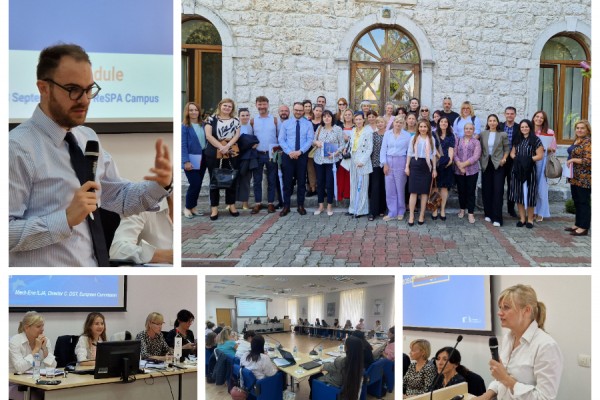
ReSPA and DG Translation Boost Translation Capacities of the Western Balkans’ Public Administrations
Today, ReSPA and Directorate General for Translation of the European Commission held the 1st of the 6-module capacity-building programme to support the translation capacities in the region, targeting topics related to translation such as management of the translation process, translation techniques, quality management framework, terminology management, usage of e-tools in translation, management of language data, procurement, etc.
More than 30 public servants from the Western Balkans teamed up with the DG Translation team in the ReSPA Campus to strengthen capacities to prepare national versions of EU Acquis. The Module was attended remotely by colleagues from Georgia, Moldova and Ukraine, who exchanged experiences and discussed with the DGT speakers and their counterparts from the Western Balkans.
In the first Module, Josefine Hederstroem, Head of Unit ‘Coordination and Institutional Affairs’, at DGT, presented the translation as part of the decision-making process and relevant challenges, while Merit-Ene Ilja, Director, DGT presented the work of DGT, its organisation, staff profiles, products and services, as well as tasks and responsibilities of translation units.
Roxana Manuela Enciu, Head of Unit ‘Demand Management’ focused on Demand management: planning and acceptance of translation requests, negotiation of deadlines, preprocessing, and correction of linguistic versions (corrigenda). Enciu also introduced participants to workflow management tools and their features.
All the sessions were characterised by questions and discussions, sharing experiences and identifying common challenges. DGT representatives praised ReSPA as a trusted partner in boosting the capacities of public servants and encouraged participants to be active and open in the next modules.
Programme Coordinator Genti Xhaxhiu concluded the day by emphasising that translating the EU acquis into the local languages is not just a linguistic exercise, but it is a critical step towards fostering the EU accession process, alignment and cooperation.
In the following modules, which will be implemented during October-December 2023, DGT staff will guide the participants through the intricacies of translating complex legal and technical documents, provide insights into the European Union's legislative framework, explore best practices for maintaining terminological consistency and linguistic accuracy, will discuss challenges related to CAT environment and procurement of translation services, etc. By the end of these seminars, attendees will be empowered to tackle the challenges of translating the acquis confidently and precisely, thereby contributing to the smooth and accurate transfer of EU law into diverse linguistic contexts.



